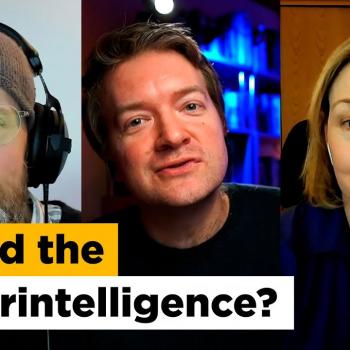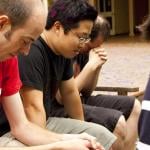
Can atheism deliver the grounding needed to live a moral life as people search for meaning in the post-Christian West? Can we develop a code of conduct by committee? Christian guest Glen Scrivener met with atheist Matt Dillahunty on The Big Conversation to discuss those very issues. And the conversation inevitably turned towards Hitler.
Godwin’s law (or Godwin’s rule of Hitler analogies) is an Internet adage asserting that “as an online discussion grows longer, the probability of a comparison involving Nazis or Hitler approaches 1”. That is, if an online discussion (regardless of topic or scope) goes on long enough, sooner or later someone will compare someone or something to Adolf Hitler or his deeds, the point at which effectively the discussion or thread often ends.
Wikipedia
The above law, attributed to American attorney Mike Godwin, is often invoked during a discussion as proof that a participant has lost an argument if they resort to using comparisons to Adolf Hitler and Nazi Germany. In this instance, it was show host Justin Brierley who brought up the example of the Third Reich.
Of course, neither he nor Scrivener were comparing Dillahunty’s humanistic brand of atheism to Nazism. Rather they were questioning whether, as an atheist, he had the moral authority to tell a Hitler-type-figure that their vision of human flourishing was wrong.
Chips off the old block
Atheists are perfectly capable of building a better society. It won’t, however, be because they are self-made men, but rather because they are created in the image of God. It won’t be because of their academic pedigree, but rather because they are chips off the old block. The problem is not their ability to promote goodness, but rather their inability to condemn evil. We can congratulate them on their Humanist Manifesto, but then ask them why their worldview prohibits them from condemning the Nazi Manifesto.
Matt Dillahunty recognizes the problem and makes the distinction between that which people believe will make the world better and that which actually does make the world better. He said in the debate:
“When Hitler goes after the Jews for whatever religious reasons he had or for whatever superior uber-guy reasons, that is fundamentally different from whether or not killing them makes society worse or better…[We need to distinguish] what we think makes us better, which is independent, from what actually makes us better.”
Dillahunty recognizes that ethical discussions need to occur at the interface between belief and practice. The problem, however, is that his worldview has a difficult time condemning a belief before the social experiment has been conducted.
If morality is nothing but the accumulated data from social experiments then why were we justified in prematurely terminating the Nazi pilot study? What criteria does Dillahunty use to pull the plug when all of the data isn’t yet in? If our pathway to the fittest survivor was paved with the bodies of inferior species then casualties are the price we pay for progress. The atheist may be able to build a better world, but he or she has no way of condemning those who try to tear it down.
Fleshing Out Flourishing
Dillahunty’s concept of well-being is quite vague, which for a guy who values data creates a bit of a problem when he tries to put together a portfolio of arguments to determine best moral practices!
Secular humanists try to base their morality on human flourishing, but what is human flourishing anyway? Is it food and water or bread and wine? Is it cave paintings or Rembrandts? Is it the Call of the Wild or Dante? Is it provision of material needs or cultivation of immaterial aesthetics?
If the former, then hunting, gathering and mating are the bottom lines. If the latter, then we need to look to the immaterial realm for help.
Moral Majority
How is it possible to determine what qualifies as human flourishing? What is the threshold? Approval by 50, 60 or 90 per cent? Strangely enough, over 90 per cent of the world’s population is religious, so if flourishing is defined by that which is best for the majority, then religion seems to qualify.
What then is the point of making the case for God’s irrelevance? Even strident atheists agree that religion must have evolved, and while they explain it away as an illusion fobbed off on us by our selfish genes to help us survive, it still remains a useful fiction. Why spend so much effort trying to exorcise the ghosts that evolution took so long to conjure up?
Metric of Malevolence
If the data for well-being can be culled from our past then why does history continue to repeat itself? How many times do we have to repeat the same experiment before we conclude that there are objective rights and wrongs that transcend the human laboratory?
Dillahunty and fellow atheist/humanist Sam Harris can cull through all the historical data they want and issue a report on best moral practices, but they still can’t reason with a Chinese government that thinks it’s OK to violate the human rights of the Uyghur Muslims.
Dillahunty acknowledges that morality begins with what we think is better but may later be proven to be wrong. He said in the debate:
“Nobody, not Sam [Harris] nor I, nor anybody, is suggesting that if we begin with an agreement on well-being as a foundation that there aren’t going to be things that we think we had the right answer about and find out we were wrong.”
Dillahunty’s thoughts seem to be in line with what Sam Harris says in his book, The Moral Landscape: How Science can Determine Human Values, about morality being one large scientific experiment:
“My goal is to convince you that human knowledge and human values can no longer be kept apart. The world of measurement and the world of meaning must eventually be reconciled. And science and religion—being antithetical ways of thinking about the same reality—will never come to terms.”
The problem with the atheist position is that it has a difficult time offering a measurable definition for well-being and flourishing, and an even bigger problem providing a metric for malevolence. I admire Harris’ desire to have the precision of a scientist but am concerned that he talks about his results with the vagary of a politician.
If morality begins as a theory and then becomes an experiment, who obtains informed consent from the experimental subjects and what is the criteria for distinguishing a successful trial from a human rights disaster?
Meeting of the Minds
Dillahunty appropriately advocates for a path of conflict resolution where we have a meeting of the minds to mark the best way forward based on shared foundations for human well-being. A great strategy for a company or an organization, but a huge problem when global worldviews clash. Glen Scrivener posed that dilemma to Dillahunty:
“At what stage then would it seem like instead of having World War II we would have a symposium in which the Nazis would present their papers and others would present other papers and then we would have a panel and we would discuss them and we would try to thrash it out. At what stage do you say that their vision for updating, for evolving, for having a master race, at what stage do you say that is morally unjustified and therefore there is a just war that can be fought against them?”
Dillahunty appropriately stated that we should always have a ‘symposium’ before we have a war. We must always pursue diplomacy before armed conflict, but the problem is that diplomacy is not about hashing out right and wrong but about balancing national interests. It’s about ensuring the survival of one’s worldview by maximizing its gains and minimizing its losses.
If Dillahunty met with Hitler prior to the war, the discussion wouldn’t have been about the foundation of human well-being, but about avoiding concessions. Wars aren’t fought over data sets of human flourishing but over power, land and money.
Cracked Foundations
In Dillahunty’s zeal to measure best moral practices, he misses the most important data point of all: despite thousands of years of logic and reason, the intent of man’s heart continues to be evil from his youth. While sitting down, finding common ground and reasoning through a conflict is a sound approach for a human resource officer in a large business with a shared corporate culture, it is useless when trying to resolve a dispute between two cultures that adhere to a completely different set of human values. Genocide is not negotiable.
Dillahunty believes that morality can be discussed reasonably by appealing to his three foundations of human well-being: life is preferable to death, health is preferable to sickness and pleasure is generally preferable to pain. He calls them foundations, but puts them on shaky ground when he says they are preferable. A foundation that is preferable is no longer a foundation but an opinion.
The problem with Dillahunty’s foundations is that they are based on the experience and not the experiencer. The quality of our experiences will change over time, but the essence of the experiencer does not. Our moral foundations, therefore, should be based on the unchanging inherent value of the individual human and not fluctuating cultural experience.
A Sounder Foundation
I think the problem with Dillahunty’s thesis is that he isn’t really looking at the foundation of our worldview houses, but is more concerned with the colour of the paint we apply to them. He isn’t concerned about the structural integrity, but the curb appeal. We don’t begin with what human’s experience but who they are.
I would offer a different set of foundational beliefs upon which to build a moral vision of the world.
- The world is ordered. Morality springs from a world that is already ordered. A world based on relationships between humans and humans, humans and nature, and humans and the cosmos (God). We expect order because we encounter it every day and we recognize disorder, knowing it shouldn’t be that way. We are inherently moral because it is built into the fabric of the universe.
- Humans are vastly different from anything found in nature. We exhibit characteristics that cannot be found in the world around us such as love, compassion, worship, morality, purpose and creativity. Our uniqueness is not defined by our physical features but by immaterial or spiritual qualities. Interestingly, we can identify an ecological niche for all the plant and animal life on the planet, but seem hard-pressed to identify the ecological niche for humans. It seems that the world would function just fine without us, so why are we here? If we can’t find our purpose by digging in the dirt then maybe it is found by mining the heavens. Maybe the niche we occupy is a spiritual, not physical one.
- Humans believe the world should be better than it is. Why do we humans think there is something wrong with the world in the first place? If we were naturally selected over millions of years, why did we wake up one morning and think that the death of the unfit was such an atrocity? Why, in a world “red in tooth and claw”, would we have this unshakeable feeling that we should be living in a land of milk and honey? Where did we get the idea of an Eden if all that exists is a wilderness?
- Humans believe that the problem with the world is humans. We don’t blame animals or plants for the world’s problems, but are quick to point the finger at humans. Herding cats is hard but making humans behave is nearly impossible. Since we know that man isn’t a beast, the rules of the jungle don’t apply. We have a conundrum: we know that humans are both awesome and awful. Unable to find our problem in our physical nature we are forced to face the fact that we are spiritually broken.
- Humans, convinced by the above facts, then have no choice but to turn to the spiritual realm. Enter religion.
The Real Final Solution
The Judeo-Christian tradition is the only one that explains these basic foundational facts. A spirit God spoke the physical world into existence in an orderly manner with defined relationships. Humans were created in the image of God as both dust and breath, physical and spiritual, to be stewards or intermediaries between a spirit God and a physical planet.
Humans wanting to be like God damaged their spirit such that they were incapable of being proper stewards and the planet has felt the physical consequences ever since. Haunted by memories of an idyllic Eden, we seek its restoration. We hear the planet groan and recognize it is our transformation that needs to take place in order to make it right again.
We acknowledge that our image is broken and needs repair so we turn to the perfect Image Bearer, the only one who truly understands the proper intimacy between the spiritual and physical and the only one capable of restoring it.
Morality without Divine Baggage
Dillahunty would no doubt accuse me of taking my understanding of morals too far and affixing unnecessary God baggage. He would say that God’s name adds nothing to the question of morality and, in fact, makes it more problematic. Since we all struggle with morality, let’s just take divine speculation off the table and get down to the brass tacks of right and wrong.
Dillahunty said he didn’t have a particular problem with religion and recognized that it could do some good but made it clear that morality doesn’t need a God “add on”. He suggested that he would take religion more seriously if it could be shown that a particular religious narrative explained our human situation and offered an appropriate solution.
I think part of the problem is that atheists/humanists view Christian morality as an imposition from on high rather than as the fabric of the universe. God didn’t sprinkle morality on top of a physical existence, but baked it into creation itself. We aren’t moral because God told us we should be, but because we were created in the image of a moral God. St. Paul acknowledged this fact when he stated that even those who aren’t Christian do what the law says.
“For when Gentiles, who do not have the law, by nature do what the law requires, they are a law to themselves, even though they do not have the law.” Romans 2:14
Morality by Committee
Anyone who has spent any time in a meeting knows that it is hard enough to approve an agenda let alone determine morality. Sadly, what ends up happening is the moral questions get tabled until the supreme court meets, the humanist society writes another manifesto or the ethical subcommittee offers its report on the outcome of ongoing social experiments. But in the meantime, ethnicities are cleansed, free speech is suppressed and human rights are violated.
C.S. Lewis’ statement in The Weight of Glory, “you have never met a mere mortal”, provides us with a sound foundation upon which to base our discussions of morality, because image bearing isn’t a spiritual badge but the basis of all human worth.
If we measure morality by the vagueness of corporate human flourishing then ‘insignificant’ men or women will fall through the cracks, but if we measure it by the eternal value of the individual then everyone gets a seat at the table.
Watch Matt Dillahunty and Glen Scrivener on The Big Conversation
















